PRINCETON, NJ -- Americans generally favor raising taxes on higher-income Americans and eliminating tax deductions for some corporations as ways of paying for President Obama's proposed jobs plan.
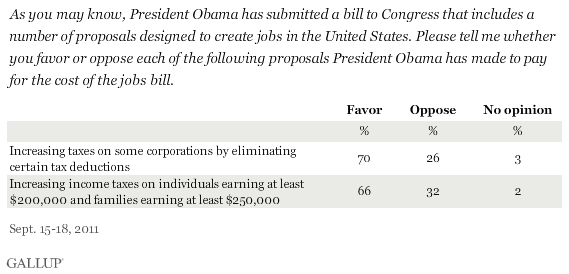
Obama laid out his proposals for the jobs bill in an address to Congress on Sept. 8, and sent the bill to Congress a few days later. Since then, the president has been pushing Congress to adopt the plan, although there are no signs yet as to when either House of Congress will begin to debate the bill.
The president also proposed raising taxes on wealthy Americans in his deficit-reduction proposal announced on Monday at the White House. Republican leaders have responded that this idea represents nothing more than "class warfare," but the current data show that the majority of Americans generally favor increasing taxes on the rich as a way to increase revenue.
Slightly more than half of rank-and-file Republicans and Republican-leaning independents favor the idea of eliminating certain corporate tax deductions as a way to pay for a jobs creation bill. Forty-one percent of Republicans favor raising taxes on higher-income Americans. Democrats strongly favor both proposals for paying for the cost of the jobs bill.
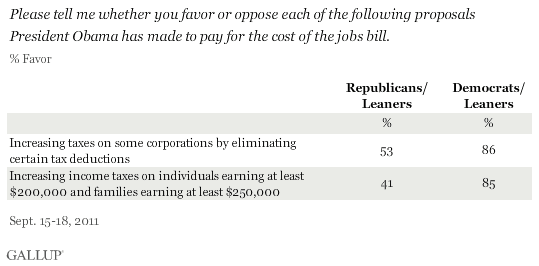
Americans Favor Almost All Proposals in Obama's Jobs Plan
Americans agree with a number of the job-creation proposals included in Obama's jobs plan -- specifically including the ideas of providing tax cuts to small businesses; providing additional funds for hiring teachers, police officers, and firefighters; and giving tax breaks to corporations for hiring the long-term unemployed. Slightly less than half favor reducing Social Security taxes for workers and employers.
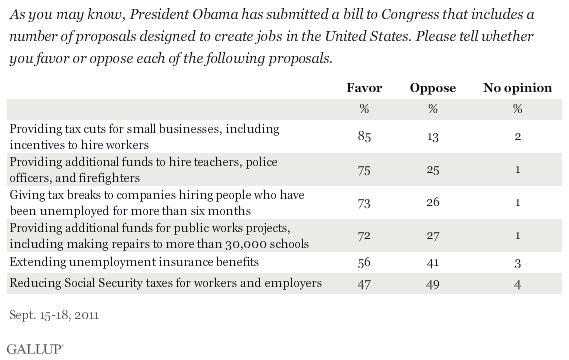
While Democrats are generally more supportive than Republicans of these proposals to create jobs, at least half of Republicans favor four of the six proposals tested.
Republicans are particularly likely to favor the idea of tax cuts for small businesses and tax breaks for companies hiring the long-term unemployed, but also favor providing funds for hiring teachers, police officers, and firefighters, and providing funds for public works projects. Less than half favor the idea of reducing Social Security taxes or extending unemployment insurance benefits.
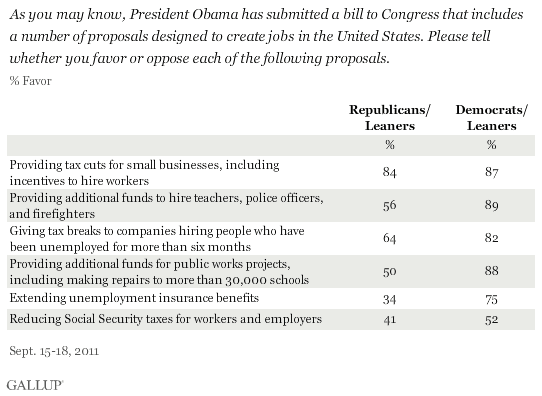
The Sept. 15-18 survey results reveal that a majority of Americans are at least modestly sanguine that the bill would help create jobs and help the economy more generally, with roughly one in four believing it would help both areas "a lot."
This is in line with Gallup's findings that a plurality of Americans want their representative in Congress to vote in favor of Obama's proposed jobs bill, based on a question that did not describe specific components of the bill.
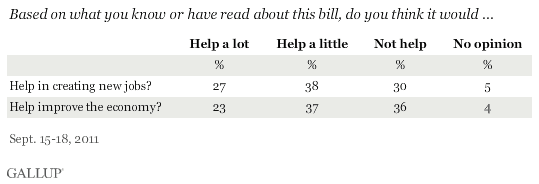
Democrats are highly likely to say Obama's proposed plan will help create jobs and help the economy, while Republicans largely disagree.
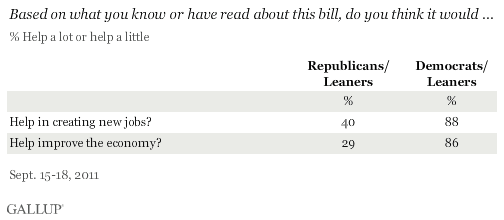
Bottom Line
This is the second Gallup survey conducted in the last two weeks showing that the American public broadly supports Obama's jobs plan. A majority of Americans interviewed this past weekend believe the plan would help at least a little to create jobs and improve the economy.
Many of the proposals embedded in the plan receive majority support, and Americans strongly endorse the idea of paying for the plan by raising taxes on higher-income individual taxpayers and by eliminating tax deductions for some corporations. While Republicans are considerably less positive about the potential efficacy of the plan than are Democrats, a majority of the former favor a number of Obama's proposals, and also favor eliminating tax deductions for corporations to help fund the plan.
Survey Methods
Results for this USA Today/Gallup poll are based on telephone interviews conducted Sept. 15-18, 2011, with a random sample of 1,004 adults, aged 18 and older, living in all 50 U.S. states and the District of Columbia.
For results based on the total sample of national adults, one can say with 95% confidence that the maximum margin of sampling error is ±4 percentage points.
Interviews are conducted with respondents on landline telephones and cellular phones, with interviews conducted in Spanish for respondents who are primarily Spanish-speaking. Each sample includes a minimum quota of 400 cell phone respondents and 600 landline respondents per 1,000 national adults, with additional minimum quotas among landline respondents by region. Landline telephone numbers are chosen at random among listed telephone numbers. Cell phone numbers are selected using random-digit-dial methods. Landline respondents are chosen at random within each household on the basis of which member had the most recent birthday.
Samples are weighted by gender, age, race, Hispanic ethnicity, education, region, adults in the household, and phone status (cell phone only/landline only/both, cell phone mostly, and having an unlisted landline number). Demographic weighting targets are based on the March 2010 Current Population Survey figures for the aged 18 and older non-institutionalized population living in U.S. telephone households. All reported margins of sampling error include the computed design effects for weighting and sample design.
In addition to sampling error, question wording and practical difficulties in conducting surveys can introduce error or bias into the findings of public opinion polls.
View methodology, full question results, and trend data.
For more details on Gallup's polling methodology, visit www.gallup.com.
